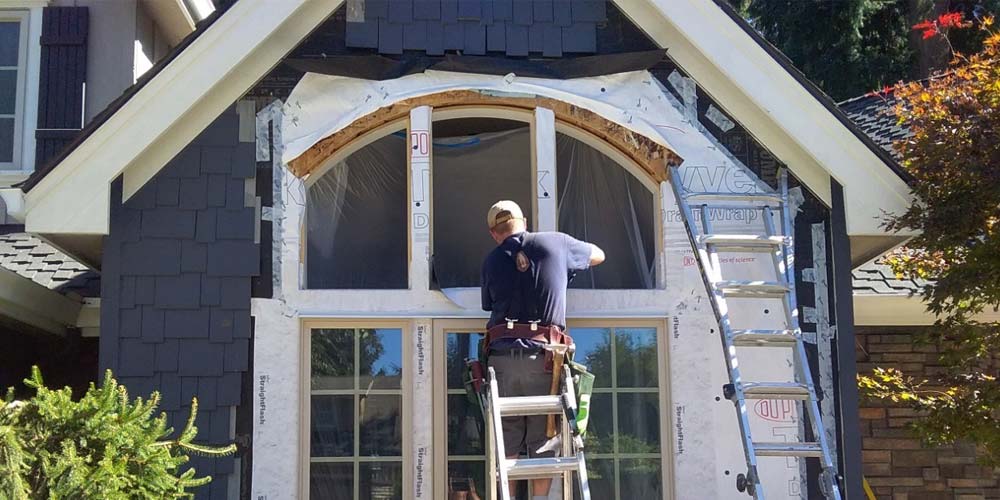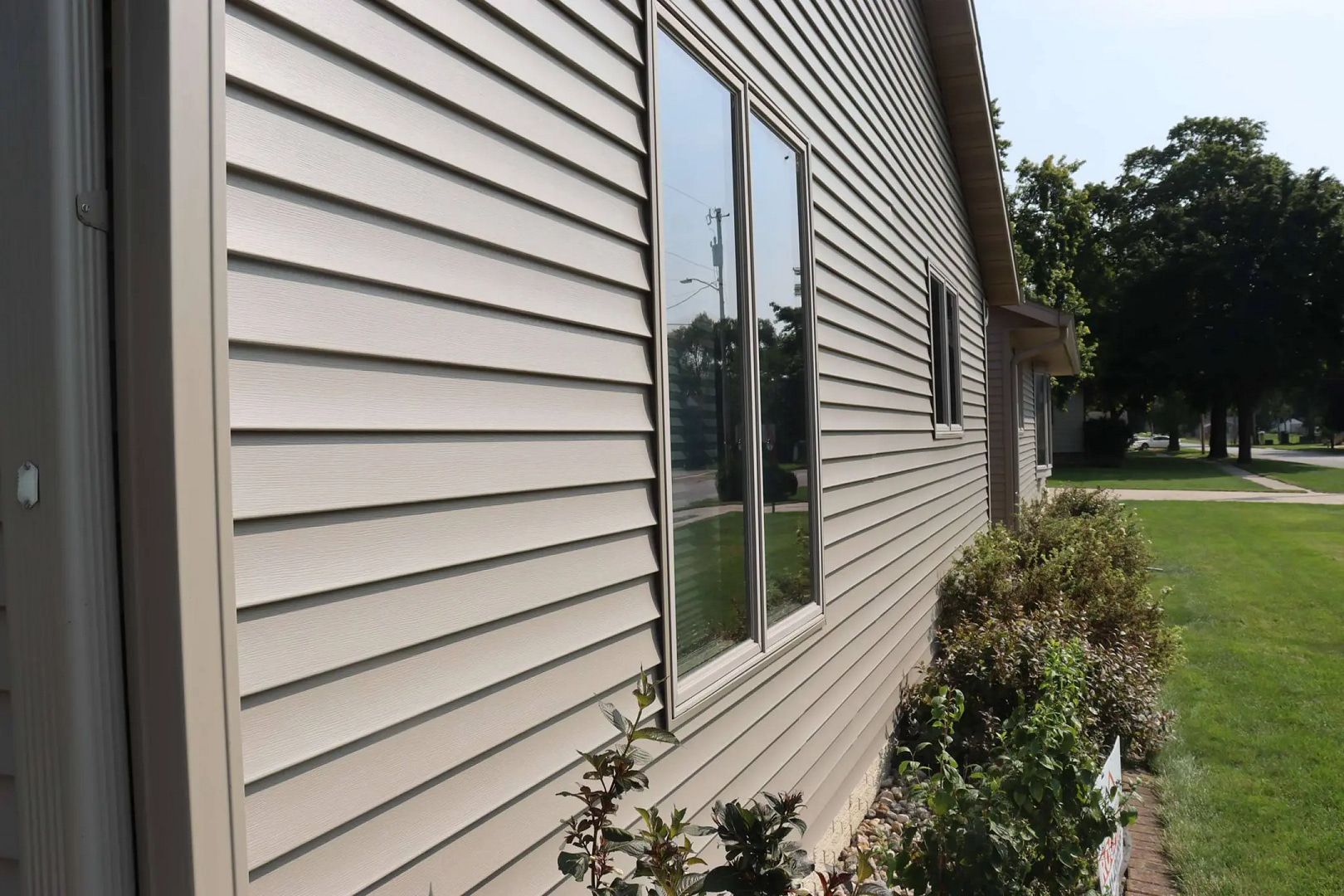Expert Morris Siding Contractor for Seamless and Long-Lasting Results
Expert Morris Siding Contractor for Seamless and Long-Lasting Results
Blog Article
The Important Overview to the Various Kinds of Siding and Their Special Benefits
In the realm of home improvement, selecting the right siding is an essential decision that impacts both visual allure and useful efficiency. With so numerous options to consider, which siding product genuinely stands out for your certain job?
Wood Siding
Timber home siding, a prominent choice for residential outsides, uses a timeless aesthetic that incorporates all-natural charm with architectural honesty. This home siding material is readily available in different styles, consisting of clapboard, roof shingles, and board-and-batten, allowing home owners to personalize their façade to match their design preferences. Wood house siding is normally crafted from resilient varieties such as cedar, redwood, or want, which are understood for their resilience and capability to withstand ecological stressors.
Among the main advantages of wood house siding is its outstanding insulation residential properties, which can add to power efficiency and reduced heating expenses. Additionally, wood siding is naturally degradable, making it an eco-friendly option when sourced sustainably. Routine upkeep, including paint or staining, can prolong its life-span and enhance its look, allowing property owners to maintain the natural appeal of the wood.
However, possible drawbacks consist of susceptibility to parasites, rot, and climate damage, requiring appropriate treatment and maintenance - morris siding contractor. Regardless of these issues, when effectively cared for, wood home siding can provide a stunning and sturdy option that boosts the personality of a home while providing a cozy, welcoming ambience

Plastic Home Siding
Vinyl home siding has become a leading option for homeowners looking for a low-maintenance outside choice that combines toughness and cost. This functional material is crafted from polyvinyl chloride (PVC), making it immune to various climate condition, consisting of dampness and UV rays. As a result, plastic exterior siding does not warp, rot, or discolor, ensuring resilient visual appeal.
Among the primary benefits of plastic siding is its comprehensive array of colors and styles, allowing house owners to attain the preferred search for their property without the requirement for constant repainting. In addition, vinyl exterior siding is very easy to install, which can considerably minimize labor prices during building or improvement tasks.
Vinyl exterior siding likewise adds to power performance. Many options function insulation backing, which improves thermal efficiency, helping to preserve comfy interior temperature levels and potentially reducing energy expenses. Its smooth surface promotes very easy cleaning, needing just regular cleaning with a yard hose pipe to remove dust and particles.
Fiber Concrete House Siding
Fiber concrete house siding has actually gotten traction among property owners and home builders alike due to its remarkable mix of durability and visual convenience. Made up of a mix of cellulose, concrete, and sand fibers, this siding alternative is crafted to endure extreme climate condition, including high winds, hefty rain, and temperature variations, making it a resilient choice for household exteriors.

Among the key benefits of fiber concrete siding is its resistance to parasites, such as termites, and its non-combustible nature, offering enhanced fire safety and security. morris siding contractor. In addition, it is offered in a vast range of styles, shades, and textures, enabling home owners to accomplish their preferred visual without sacrificing performance
An additional advantage is its low maintenance needs; fiber cement exterior siding commonly requires painting or staining every 5-10 years, which is less regular than various other materials. Its longevity contributes to a lower general price of possession, as it reduces the need for regular fixings or replacements.
Eventually, fiber cement exterior siding represents an outstanding investment for those looking for a durable, appealing, and flexible exterior choice, integrating both type and function to enhance the home's curb appeal.
Metal Exterior Siding
The appeal of metal siding hinges on its durable durability and modern visual allure, making it a resource preferred option for contemporary architecture. Readily available in products such as light weight aluminum and steel, metal siding supplies a variety of surfaces and colors, permitting property owners to attain a tailored look that matches their design vision.

Power effectiveness is one more considerable benefit, as lots of steel home siding items are created with insulation choices that assist control indoor temperatures. This can result in decreased energy expenses in time. Additionally, metal siding is frequently recyclable, making it an environmentally friendly choice for sustainability-minded homeowners.
The installment procedure for steel exterior siding can be relatively straightforward, resulting in a quicker turn-around time for building and construction jobs. Generally, metal siding incorporates functionality and design, making it a functional option for those looking for a aesthetically attractive and enduring outside surface.
Brick and Rock Exterior Siding
Block and stone house siding stands out as an ageless choice that improves the aesthetic beauty of any type of home. Known for their resilience and reduced maintenance, these products offer an outstanding roi while boosting the property's visual appeal. Readily available in various shades, textures, and patterns, block and stone can be tailored to match diverse building styles, from standard to modern.
Among the main benefits of block and stone home siding is their power efficiency. Both materials have natural protecting properties that assist control interior temperatures, potentially minimizing cooling and heating expenses. In addition, they supply exceptional fire resistance contrasted to various other siding choices, adding to improved safety and security.
Another benefit is their durability. Block and stone can last for decades, typically needing very little maintenance past periodic cleansing. Unlike timber home siding, they are resistant to parasites and rot, ensuring a long-lasting exterior that withstands the elements.
Conclusion
In recap, the choice of home siding significantly impacts a home's visual charm, power performance, and upkeep needs. Each type of house siding-- whether timber, vinyl, fiber steel, block, or concrete and rock-- supplies distinct advantages tailored to numerous homeowner choices and ecological conditions.
One of the main advantages of timber exterior siding is its exceptional insulation buildings, which can contribute to power efficiency and reduced heating expenses. In addition, timber house siding is naturally degradable, making it an environmentally pleasant option when sourced sustainably.One of the main advantages of metal exterior siding is its explanation resistance to various environmental elements.Energy effectiveness is an additional substantial benefit, as several steel home siding products are next page designed with insulation alternatives that aid manage interior temperatures. Each type of house siding-- whether timber, vinyl, fiber metal, brick, or concrete and rock-- offers special advantages tailored to different homeowner choices and environmental conditions.
Report this page